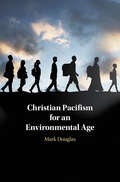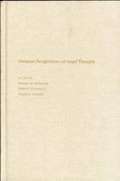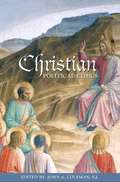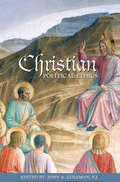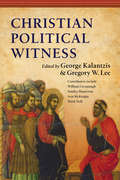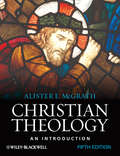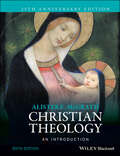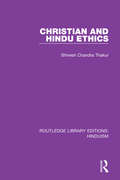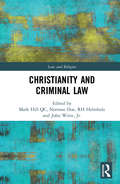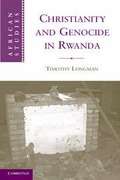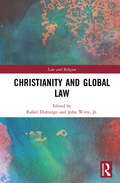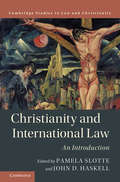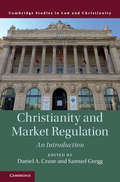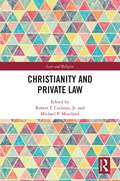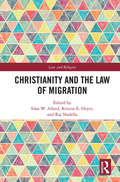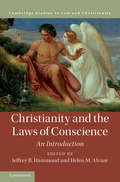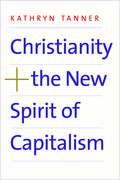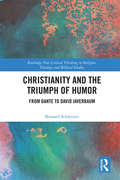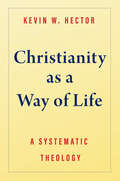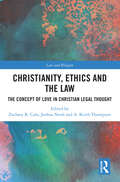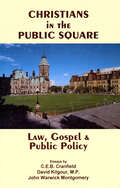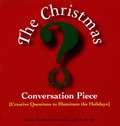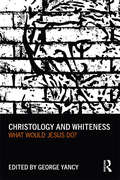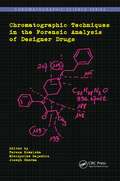- Table View
- List View
Christian Pacifism for an Environmental Age
by Mark DouglasIn this volume, Mark Douglas offers a new vision of the history of Christian pacifism within the context of a warming world. He narrates this story in a way that recognizes the complexities of the tradition and aligns it with a coherent theological vision, one that shapes the tradition to encompass the new causes and types of wars fought during the Anthropocene. Along the way, Douglas draws from research in historical climatology to recover the overlooked role that climate changes have always played in shaping not only the Christian pacifist tradition but also the movement of traditions through western history. Scholars across a range of disciplines - peace studies, Christian theology and history, environmentalism, and environmental conflict studies - will benefit from this model of critical and charitable engagement with the complex history of Christian pacifism, the resources of which will be important for addressing wars in a warming world.
Christian Perspectives on Legal Thought
by Michael W. Mcconnell Robert F. Cochran Angela C. CarmellaDifferent American legal scholars have joined together to produce 'Christian Perspectives On Legal Thought', a book that views legal thought from various Christian perspectives.
Christian Political Ethics
by John A. ColemanChristian Political Ethics brings together leading Christian scholars of diverse theological and ethical perspectives- Catholic, Lutheran, Calvinist, and Anabaptist- to address fundamental questions of state and civil society, international law and relations, the role of the nation, and issues of violence and its containment. Representing a unique fusion of faith-centered ethics and social science, the contributors bring into dialogue their own varying Christian understandings with a range of both secular ethical thought and other religious viewpoints from Judaism, Islam, and Confucianism. They explore divergent Christian views of state and society- and the limits of each. They grapple with the tensions that can arise within Christianity over questions of patriotism, civic duty, and loyalty to one's nation, and they examine Christian responses to pluralism and relativism, globalization, and war and peace. Revealing the striking pluralism inherent to Christianity itself, this pioneering volume recasts the meanings of Christian citizenship and civic responsibility, and raises compelling new questions about civil disobedience, global justice, and Christian justifications for waging war as well as spreading world peace. It brings Christian political ethics out of the churches and seminaries to engage with today's most vexing and complex social issues.
Christian Political Ethics (Ethikon Series in Comparative Ethics)
by John A. ColemanChristian Political Ethics brings together leading Christian scholars of diverse theological and ethical perspectives--Catholic, Lutheran, Calvinist, and Anabaptist--to address fundamental questions of state and civil society, international law and relations, the role of the nation, and issues of violence and its containment. Representing a unique fusion of faith-centered ethics and social science, the contributors bring into dialogue their own varying Christian understandings with a range of both secular ethical thought and other religious viewpoints from Judaism, Islam, and Confucianism. They explore divergent Christian views of state and society--and the limits of each. They grapple with the tensions that can arise within Christianity over questions of patriotism, civic duty, and loyalty to one's nation, and they examine Christian responses to pluralism and relativism, globalization, and war and peace. Revealing the striking pluralism inherent to Christianity itself, this pioneering volume recasts the meanings of Christian citizenship and civic responsibility, and raises compelling new questions about civil disobedience, global justice, and Christian justifications for waging war as well as spreading world peace. It brings Christian political ethics out of the churches and seminaries to engage with today's most vexing and complex social issues. The contributors are Michael Banner, Nigel Biggar, Joseph Boyle, Michael G. Cartwright, John A. Coleman, S.J., John Finnis, Theodore J. Koontz, David Little, Richard B. Miller, James W. Skillen, and Max L. Stackhouse.
Christian Political Witness (Wheaton Theology Conference Series)
by Gregory W. Lee George KalantzisContributors include:Stanley HauerwasMark NollScot McKnightTimothy G. GombisGeorge KalantzisJana Marguerite BennettWilliam T. CavanaughPeter J. LeithartDaniel M. Bell Jr.Jennifer M. McBrideDavid P. GusheeBishop David Gitari
Christian Theology
by Alister E. McgrathAlister McGrath's Christian Theology: An Introduction is one of the most internationally-acclaimed and popular Christian theology textbooks in use today. This 5th edition has been completely revised, and now features new and extended material, numerous additional illustrations, and companion resources, ensuring it retains its reputation as the ideal introduction to Christian theology.Fully updated 5th edition of the bestselling textbook, incorporating expanded material, numerous student features and new illustrations Features new sections on Copernicanism and Darwinism Includes extended discussions of Augustine's doctrine of creation, Trinitarian theologies of religion, and the relation of Christianity to other faiths May be used as a stand-alone volume, or alongside the Christian Theology Reader, 4th edition for a complete overview of the subject Retains the chapter structure of the 4th edition, ensuring comparability with earlier editions and courses based on these Accompanied by a revised instructor's website featuring expanded resources including study questions and answers; visit www.wiley.com/go/mcgrath for more details and to register for access
Christian Theology: An Introduction (Coursesmart Ser.)
by Alister E. McGrathCHRISTIAN THEOLOGY “The genius of Alister E. McGrath is his remarkable ability to write in a clear, concise, and lucid manner that draws both teachers and students to participate with the great thinkers of the Christian tradition, past and present. Education and illumination are the abundant fruits of this massive, well-organized text, which is sure to appeal to a wide range of Protestant, Catholic, and Orthodox audiences. For this we are indebted to the author.” Dennis Ngien, Professor of Systematic Theology, Tyndale University College and Seminary, Toronto, Canada “For sheer comprehensiveness, clarity, and coherence, Alister McGrath has produced the definitive textbook. Always accurate and engaging, students are gently introduced to the gift of Theology in a memorable way.” Ian S. Markham, Dean and President of Virginia Theological Seminary Praise for the fifth edition “Alister McGrath has proven himself a master at engagingly and simply introducing Christian theology in all of its contested complexity. All who work at the critical appropriation of the theological tradition stand in debt to McGrath.” M. Douglas Meeks, Cal Turner Chancellor Professor of Theology and Wesleyan Studies, Vanderbilt University Divinity School Now celebrating its 25th year of publication, Christian Theology is one of the most internationally acclaimed textbooks in this area today. Completely rewritten for the sixth edition, it remains the ideal introduction to the beliefs and interpretation of Christianity. It is specifically designed for students with no prior knowledge, presenting the primary themes and debates of Christian theology with clarity and historical context. This new edition retains all the elements that have made it so successful while also including significant additions and developments. There is an increased discussion of contemporary theology to complement the excellent coverage of historical material. Important new information has also been added, in areas such as the Holy Spirit, contemporary non-Western theologies, and feminist voices in Christian theology. The text is rich in pedagogy to encourage student learning, featuring a two colour design, glossary, end-of-chapter discussion questions, and much more. Written by renowned theologian Alister E. McGrath, this classic text is a clear, lively and concise introduction that provides instructors with the tools they need to engage with their students on Christian theology.
Christian and Hindu Ethics (Routledge Library Editions: Hinduism #1)
by Shivesh Chandra ThakurHinduism and Christianity are different in structure and approach – but have a great deal in common in matters relating to ethics. This book, first published in 1969, is the first systematic and detailed work which attempts to bring out both the differences and similarities. The author selects some of the fundamental problems of philosophical ethics, such as the moral law – its authority and sources, moral effort and human freedom, moral failure and responsibility – and explores the respective answers of Hinduism and Christianity.
Christianity and Criminal Law (Law and Religion)
by John Witte Jr Norman Doe Mark Hill Qc Rh HelmholzThis collection, by leading legal scholars, judges and practitioners, together with theologians and church historians, presents historical, theological, philosophical and legal perspectives on Christianity and criminal law. Following a Preface by Lord Judge, formerly Lord Chief Justice of England and Wales, and an introductory chapter, the book is divided into four thematic sections. Part I addresses the historical contributions of Christianity to criminal law drawing on biblical sources, early church fathers and canonists, as far as the Enlightenment. Part II, titled Christianity and the principles of criminal law, compares crime and sin, examines concepts of mens rea and intention, and considers the virtue of due process within criminal justice. Part III looks at Christianity and criminal offences, considering their Christian origins and continuing relevance for several basic crimes that every legal system prohibits. Finally, in Part IV, the authors consider Christianity and the enforcement of criminal law, looking at defences, punishment and forgiveness. The book will be an invaluable resource for students and academics working in the areas of Law and Religion, Legal Philosophy and Theology.
Christianity and Freedom Volume 2. Contemporary Perspectives ( Law and Christianity)
by Allen D. Hertzke Timothy Samuel ShahVolume 2 of Christianity and Freedom illuminates how Christian minorities and transnational Christian networks contribute to the freedom and flourishing of societies across the globe, even amidst pressure and violent persecution. Featuring unprecedented field research by some of the world's most distinguished scholars, it documents the outsized role of Christians in promoting human rights and religious freedom; fighting injustice; stimulating economic equality; providing education, social services, and health care; and nurturing democratic civil society. Readers will come away surprised and sobered to learn how this very Christian link to freedom often invites persecution. What are the dimensions of persecution and how are Christians responding to that pressure? What resources - theological, social, or transnational - do they marshal in leavening their societies? What will be lost if the Christian presence is marginalized? The answers to these questions are of crucial relevance in a world awash with religious extremism and deepening instability. Gathers top scholarship on Christianity and human rights. Corrects prevailing misconceptions of the historical development of liberal freedoms. Shows how a profound theological idea propelled innovations in human history.
Christianity and Genocide in Rwanda
by Timothy LongmanAlthough Rwanda is among the most Christian countries in Africa, in the 1994 genocide, church buildings became the primary killing grounds. To explain why so many Christians participated in the violence, this book looks at the history of Christian engagement in Rwanda and then turns to a rich body of original national and local-level research to argue that Rwanda's churches have consistently allied themselves with the state and played ethnic politics. Comparing two local Presbyterian parishes in Kibuye prior to the genocide demonstrates that progressive forces were seeking to democratize the churches. Just as Hutu politicians used the genocide of Tutsi to assert political power and crush democratic reform, church leaders supported the genocide to secure their own power. The fact that Christianity inspired some Rwandans to oppose the genocide demonstrates that opposition by the churches was possible and might have hindered the violence.
Christianity and Global Law (Law and Religion)
by John Witte Jr. Rafael DomingoThis book explores both historical and contemporary Christian sources and dimensions of global law and includes critical perspectives from various religious and philosophical traditions. Two dozen leading scholars discuss the constituent principles of this new global legal order historically, comparatively, and currently. The first part uses a historical-biographical approach to study a few of the major Christian architects of global law and transnational legal theory, from St. Paul to Jacques Maritain. The second part distills the deep Christian sources and dimensions of the main principles of global law, historically and today, separating out the distinct Catholic, Protestant, and Orthodox Christian contributions as appropriate. Finally, the authors address a number of pressing global issues and challenges, where a Christian-informed legal perspective can and should have deep purchase and influence. The work makes no claim that Christianity is the only historical shaper of global law, nor that it should monopolize the theory and practice of global law today. But the book does insist that Christianity, as one of the world’s great religions, has deep norms and practices, ideas and institutions, prophets and procedures that can be of benefit as the world struggles to find global legal resources to confront humanity’s greatest challenges. The volume will be an essential resource for academics and researchers working in the areas of law and religion, transnational law, legal philosophy, and legal history.
Christianity and International Law: An Introduction (Law and Christianity)
by Pamela Slotte John D. HaskellThis cross-disciplinary collaboration offers historical and contemporary scholarship exploring the interface of Christianity and international law. Christianity and International Law aims to understand and move past arguments, narratives and tropes that commonly frame law-religion studies in global governance. Readers are introduced to a range of confessional and critical perspectives explicitly engaging a diverse range of methodological and theoretical orientations to rethink how we experience and find ourselves caught within the phenomena of Christianity and international law.
Christianity and Market Regulation: An Introduction (Law and Christianity)
by Samuel Gregg Daniel A. CraneHistorically, the Christian tradition has played an influential role in Western economic thought concerning the regulation of markets, but, with the fracturing of the Christian tradition following the Reformation, the decline of Christian influence in academia, and the increasing specialization of economic analysis, that influence has become increasingly opaque. This volume brings together an interdisciplinary team of prominent academic experts on market regulation from four different continents and various faith traditions to reconsider the impact of Christianity on market regulation. Drawing on law, economics, history, theology, philosophy, and political theory, the authors consider both general questions of market regulation and particular regulatory fields such as bankruptcy, corporate law, and antitrust from a Christian perspective.
Christianity and Private Law (Law and Religion)
by Robert F. Cochran Jr. Michael P. MorelandThis volume examines the relationship between Christian legal theory and the fields of private law. Recent years have seen a resurgence of interest in private law theory, and this book contributes to that discussion by drawing on the historical, theological, and philosophical resources of the Christian tradition. The book begins with an introduction from the editors that lays out the understanding of "private law" and what distinguishes private law topics from other fields of law. This section includes two survey chapters on natural law and biblical sources. The remaining sections of the book move sequentially through the fields of property, contracts, and torts. Several chapters focus on historical sources and show the ways in which the evolution of legal doctrine in areas of private law has been heavily influenced by Christian thinkers. Other chapters draw out more contemporary and public policy-related implications for private law. While this book is focused on the relationship of Christianity to private law, it will be of broad interest to those who might not share that faith perspective. In particular, legal historians and philosophers of law will find much of interest in the original scholarship in this volume. The book will be attractive to teachers of law, political science, and theology. It will be of special interest to the many law faculty in property, contracts, and torts, as it provides a set of often overlooked historical and theoretical perspectives on these fields.
Christianity and the Law of Migration (Law and Religion)
by Silas W. Allard; Kristin E. Heyer; Raj NadellaThis collection brings together legal scholars and Christian theologians for an interdisciplinary conversation responding to the challenges of global migration. Gathering 14 leading scholars from both law and Christian theology, the book covers legal perspectives, theological perspectives, and key concepts in migration studies. In Part 1, scholars of migration law and policy discuss the legal landscape of migration at both the domestic and international level. In Part 2, Christian theologians, ethicists, and biblical scholars draw on the resources of the Christian tradition to think about migration. In Part 3, each chapter is co-authored by a scholar of law and a scholar of Christian theology, who bring their respective resources and perspectives into conversation through a conversation on key themes within migration studies. The work provides a truly interdisciplinary introduction to the topic of migration for those who are new to the subject; an opportunity for immigration lawyers and legal scholars to engage Christian theology; an opportunity for pastors and Christian theologians to engage law; and new insights on key frameworks for scholars who are already committed to the study of migration.
Christianity and the Laws of Conscience: An Introduction (Law and Christianity)
by Helen M. Alvaré Jeffrey B. HammondConscience has long been a foundational theme in Christian ethics, but it is a notoriously slippery and contested term. This volume works to define conscience and reveal the similarities and differences between different Christian traditions' thinking on the subject. In a thorough and scholarly manner, the authors explore Christian theological, legal, constitutional, historical, and philosophical meanings of conscience. Covering a range of historical periods, major figures in the development of conscience, and contemporary applications, this book is a vital source for scholars from a wide variety of disciplines seeking to understand conscience from a range of perspectives.
Christianity and the New Spirit of Capitalism
by Kathryn TannerOne of the world’s most celebrated theologians argues for a Protestant anti-work ethic In his classic The Protestant Ethic and the Spirit of Capitalism, Max Weber famously showed how Christian beliefs and practices could shape persons in line with capitalism. In this significant reimagining of Weber’s work, Kathryn Tanner provocatively reverses this thesis, arguing that Christianity can offer a direct challenge to the largely uncontested growth of capitalism. Exploring the cultural forms typical of the current finance‑dominated system of capitalism, Tanner shows how they can be countered by Christian beliefs and practices with a comparable person‑shaping capacity. Addressing head‑on the issues of economic inequality, structural under- and unemployment, and capitalism’s unstable boom/bust cycles, she draws deeply on the theological resources within Christianity to imagine anew a world of human flourishing. This book promises to be one of the most important theological books in recent years.
Christianity and the Triumph of Humor: From Dante to David Javerbaum (Routledge New Critical Thinking in Religion, Theology and Biblical Studies)
by Bernard SchweizerThis book traces the development of religious comedy and leverages that history to justify today’s uses of religious humor in all of its manifestations, including irreverent jokes. It argues that regulating humor is futile and counterproductive, illustrating this point with a host of comedic examples. Humor is a powerful rhetorical tool for those who advocate and for those who satirize religious ideals. The book presents a compelling argument about the centrality of humor to the story of Western Christianity’s cultural and artistic development since the Middle Ages, taking a multi-disciplinary approach that combines literary criticism, religious studies, philosophy, theology, and social science. After laying out the conceptual framework in Part 1, Part 2 analyzes key works of religious comedy across the ages from Dante to the present, and it samples the breadth of contemporary religious humor from Brad Stine to Robin Williams, and from Monty Python to South Park. Using critical, historical, and conceptual lenses, the book exposes and overturns past attempts by church authorities, scholars, and commentators to limit and control laughter based on religious, ideological, or moral criteria. This is a unique look into the role of humor and comedy around religion. It will, therefore, be of great interest to scholars of Religious Studies, Humor Studies, and the Sociology of Religion.
Christianity as a Way of Life: A Systematic Theology
by Kevin W HectorFocusing on Christianity’s core practices, a leading theologian imagines Christianity as a way of life oriented toward wisdom In this book, Kevin W. Hector argues that we can understand Christianity as a set of practices designed to transform one’s way of perceiving and being in the world. Hector examines practices that reorient us to God (imitation, corporate singing, eating together, friendship, and likemindedness), that transform our way of being in the world (prayer, wonder, laughter, lament, and vocation), and that reshape our way of being with others (benevolence, looking for the image of God in others, forgiveness, and activism). Taken together, the aim of these practices is to transform one’s way of perceiving and acting in the face of success and failure, risk and loss, guilt and shame, love, and loss of control. These transformations can add up to a transformation of one’s very self. To make sense of Christianity as a way of life, in turn, these practices must be understood within the context of Christian beliefs about sin, Jesus, redemption, and eternal life. Understanding them thus requires a systematic theology, which Hector offers in this clear-eyed, ambitious, and elegant interpretation of the Christian tradition.
Christianity, Ethics and the Law: The Concept of Love in Christian Legal Thought (Law and Religion)
by Zachary R. Calo, Joshua Neoh and A. Keith ThompsonThis book examines how Christian love can inform legal thought. The work introduces love as a way to advance the emergent conversation between constructive theology and jurisprudence that will also inform conversations in philosophy and political theory. Love is the central category for Christian ethical understanding. Yet, the growing field of law and religion, and relatedly law and theology, rarely address how love can shape our understanding of law. This reflects, in part, a common assumption that law and love stand in necessary tension. Love applies to the private and the personal. Law, by contrast, applies to the public and the political, realms governed by power. It is thus a mistake to envisage love as having anything but a negative relationship to law. This conclusion continues to govern Christian understandings of the meaning and vocation of law. The animating idea of this volume is that the concept of love can and should inform Christian legal thought. The project approaches this task from the perspective of both historical and constructive theology. Various contributions examine how such thinkers as Augustine, Aquinas, and Calvin utilised love in their legal thought. These essays highlight often neglected aspects of the Christian tradition. Other contributions examine Christian love in light of contemporary legal topics including civility, forgiveness, and secularism. Love, the book proposes, not only matters for law but can transform the terms on which Christians understand and engage it.? The book will be of interest to academics and researchers working in the areas of legal theory; law and religion; law and philosophy; legal history; theology and religious studies; and political theory.
Christians In The Public Square: Law, Gospel, & Public Policy
by John Warwick MontgomeryThis collection of articles examining the inter-relationship between "law" and "gospel"; what a Christian should and should not attempt to do in the public realm of politics; and bioethical issues. Included are essays by David Kilgour, one of Canada's longest serving Members of Parliament, providing the perspective of a practicing politician; and theologian C. E. B. Cranfield on the New Testament's teaching.
Christmas Conversation Piece
by Bret Nicholaus Paul LowrieWhat one Christmas tradition would you never want to give up? If you could spend Christmas anywhere in the world, where would you most want to be? If you could have visited the Christ child just as the Three Kings did, what would you have brought as a gift? You've been chosen to host a sensational Christmas celebration on TV: What three guests would you choose to make it the best Christmas special ever? The Christmas Conversation Pieceoffers these and many other questions to pose and ponder during a season of both deep reflection and unabashed merriment. This charming volume--the perfect stocking stuffer--will provide you, your family, and your friends with twelve days of surprising and amusing Yuletide questions. Who would you most like to meet under the mistletoe? Your answer just may change by Christmas Eve!
Christology and Whiteness: What Would Jesus Do?
by George YancyThis book explores Christology through the lens of whiteness, addressing whiteness as a site of privilege and power within the specific context of Christology. It asks whether or not Jesus’ life and work offers theological, religious and ethical resources that can address the question of contemporary forms of white privilege. The text seeks to encourage ways of thinking about whiteness theologically through the mission of Jesus. In this sense, white Christians are encouraged to reflect on how their whiteness is a site of tension in relation to their theological and religious framework. A distinguished team of contributors explore key topics including the Christology of domination, different images of Jesus and the question of identification with Jesus, and the Black Jesus in the inner city.
Chromatographic Techniques in the Forensic Analysis of Designer Drugs (Chromatographic Science Series)
by Joseph Sherma Teresa Kowalska Mieczyslaw SajewiczThere is a dramatic rise of novel drug use due to the increased popularity of so-called designer drugs. These synthetic drugs can be illegal in some countries, but legal in others and novel compounds unknown to drug chemistry emerge monthly. This thoughtfully constructed edited reference presents the main chromatographic methodologies and strategies used to discover and analyze novel designer drugs contained in diverse biological materials. The methods are based on molecular characteristics of the drugs belonging to each individual class of compounds, so it will be clear how the current methods are adaptable to future new drugs that appear in the market.
